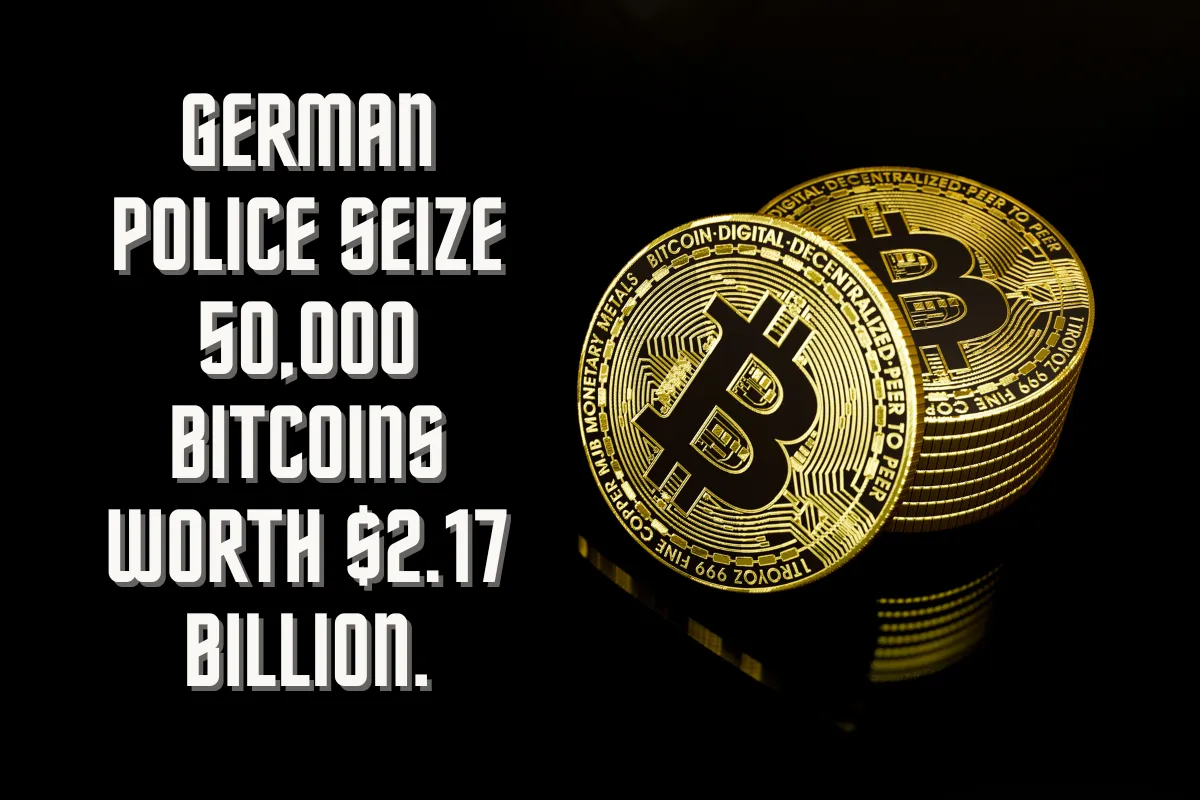In a dramatic turn of events that rocked the cryptocurrency world, German law enforcement authorities made headlines by seizing a staggering 50,000 bitcoins, equivalent to a mind-boggling $2.17 billion.
This unprecedented seizure not only highlights the growing presence of cryptocurrencies in illicit activities but also underscores the relentless efforts of authorities to combat financial crimes in the digital asset space.
The Crypto Heist Unveiled

The seizure unfolded as part of a meticulously planned operation aimed at dismantling a sprawling network involved in a myriad of illegal activities, including money laundering, drug trafficking, and other nefarious endeavors.
Leveraging advanced blockchain analysis techniques and intelligence gathering, German authorities identified key players within the illicit network and swiftly moved to apprehend them.
Unraveling the Bitcoin Stash

The focal point of the operation was the confiscation of an astronomical sum of 50,000 bitcoins, representing a substantial portion of the cryptocurrency market.
With each bitcoin valued at around $43,400 at the time of seizure, the total haul amounted to an eye-watering $2.17 billion, sending shockwaves through the cryptocurrency community and beyond.
Implications for Cryptocurrency Regulation

The seizure of such a significant amount of bitcoins underscores the pressing need for robust regulatory frameworks to govern the cryptocurrency ecosystem.
While cryptocurrencies offer numerous benefits, including decentralization and security, they also present unique challenges, particularly in terms of combating financial crimes and ensuring investor protection.
The Regulatory Landscape Evolves

In response to the growing prevalence of cryptocurrencies in illicit activities, governments and regulatory bodies worldwide are ramping up their efforts to enhance transparency and oversight within the digital asset space.
From implementing stringent anti-money laundering (AML) and know-your-customer (KYC) regulations to bolstering cybersecurity measures, regulators are leaving no stone unturned in their quest to safeguard the integrity of the financial system.
Lessons Learned and Future Outlook
The seizure of 50,000 bitcoins worth $2.17 billion serves as a sobering reminder of the inherent risks associated with cryptocurrencies and the importance of proactive regulatory intervention.
As the cryptocurrency landscape continues to evolve, collaboration between governments, law enforcement agencies, and industry stakeholders will be crucial in fostering a safe, secure, and compliant environment for all participants.
Conclusion:
The landmark seizure of 50,000 bitcoins by German authorities represents a significant milestone in the ongoing battle against financial crimes in the cryptocurrency space.
While cryptocurrencies hold immense promise for innovation and financial inclusion, they also pose significant challenges in terms of security and regulatory compliance.
By working together to implement effective regulatory measures, we can ensure that the potential of cryptocurrencies is realized while mitigating the risks of illicit activities.
FAQs:
Q1: How did German authorities seize the bitcoins?
A1: German law enforcement agencies used advanced blockchain analysis techniques and intelligence gathering to identify and apprehend individuals involved in illicit activities, ultimately leading to the confiscation of the bitcoins.
Q2: What will happen to the seized bitcoins?
A2: The fate of the seized bitcoins will likely depend on the outcome of legal proceedings.
In some cases, seized assets may be liquidated and used to compensate victims or fund law enforcement initiatives.
Q3: How does this seizure impact the cryptocurrency market?
A3: The seizure of such a significant amount of bitcoins may temporarily impact market sentiment, but it also underscores the need for regulatory clarity and compliance within the cryptocurrency industry.
Q4: Could similar seizures occur in other countries?
A4: Absolutely. As cryptocurrencies gain mainstream acceptance, governments and regulatory bodies worldwide are increasingly focusing on combating financial crimes and ensuring compliance with existing regulations.
Q5: What steps can individuals take to protect themselves from involvement in illicit activities?
A5: Individuals should exercise caution when engaging in cryptocurrency transactions and adhere to relevant laws and regulations.
Additionally, staying informed about potential risks and practicing good cybersecurity hygiene can help mitigate the likelihood of inadvertently participating in illicit activities.




